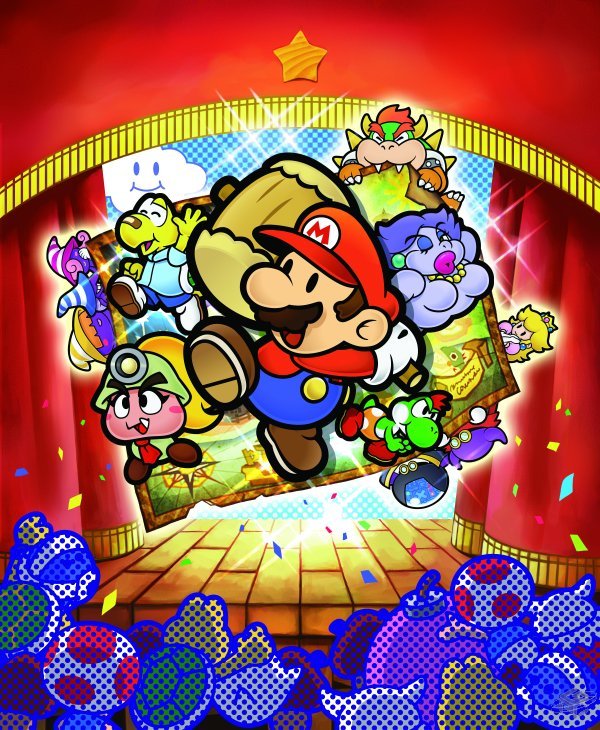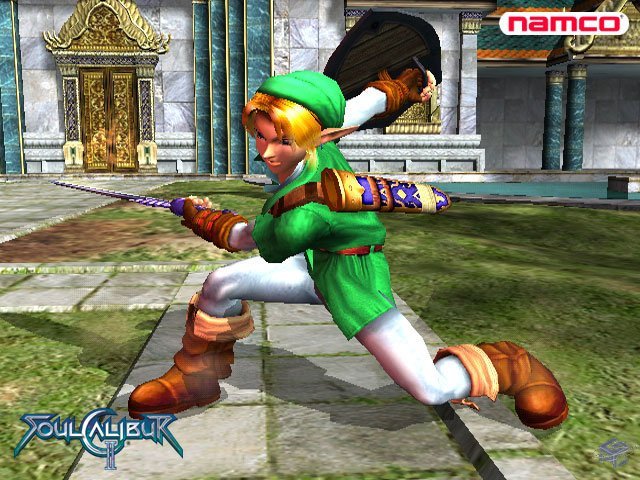Twilight Princess and Soul Calibur II are the clear-cut winners in this portion.
Now that we’re done the Wild Card Round, it’s time to get to the fun stuff. Round 1, aka the Round of 64, features a ridiculous 32 match-ups between 64 deserving games. We’ve split them all into four regions, led by the highest-rated games (according to Nintendo World Report and MetaCritic) of the entire batch: Metroid Prime, Super Mario Galaxy, The Wind Waker, and Resident Evil 4. Go ahead and vote for these match-ups and show your colors in the discussion. What’s your Cinderella game?
Voting ends on March 15 at around 1 a.m. ET. On March 16, we'll have Round 2, with 32 games and 16 match-ups, ready to go...
The Legend of Zelda: Four Swords Adventures (11) vs. Mario & Luigi: Superstar Saga (6)
The Legend of Zelda: Four Swords Adventures: Multiplayer Zelda? Is that even possible? When you have four Links, yes, and it’s almost just as bad as playing Mario Party if you want to lose friends. The 2004 GameCube game Four Swords Adventures takes the traditional Zelda handheld formula and twists it into a multiplayer adventure that utilized the cooperation between the Game Boy Advance and GameCube. Each level is Zelda-esque in style, but with a kind of Mario structure with a beginning and ending. The interesting gameplay makes this one possibly the most unique entry in the entire Zelda franchise.
Mario & Luigi: Superstar Saga: The fact that this—the original—Mario & Luigi game, released in 2003 on Game Boy Advance, is the best of the four is either extremely high praise for it, individually, or a damnation of the other three games. I prefer to think of Mario & Luigi: Superstar Saga as separate from its sequels, as it does everything really, really well. While the other games struggle to maintain freshness and overstay their welcomes, Superstar Saga is briskly paced and ends right when it needs to. The colorful world is chock-full of cameos and cornball humor, and it is here, of course, that we first meet the series’ real superstar: Fawful. He has fury, and the Mario Bros. have a great shot at pulling ahead in this tournament.
Vote here!
Paper Mario: The Thousand-Year Door (WC) vs. Soul Calibur II (3)
Paper Mario: The Thousand Year Door: The sequel to the Nintendo 64 original, Paper Mario: The Thousand Year Door is not just a fun game to play, it’s also one of the funniest games you’ll find on the GameCube. Mario ventures forth on an adventure to find Princess Peach, who has gone missing, in a search for the Thousand-Year Door, which apparently leads to riches for whoever opens it. Using the same system as the previous Paper Mario game, Mario partners with one of his various allies throughout the game to solve puzzles as well as battle using the timed hit system from Super Mario RPG. It doesn’t stray from the original’s formula too much, but Paper Mario: The Thousand Year Door delivers in terms of a fun, humor filled adventure that’s full of charm.
Soul Calibur II: In continuing the quest to find or destroy the infamous Soul Edge, Soul Calibur II plainly elevated itself as a franchise. When released to consoles in 2003, the GameCube received the generous privilege of exclusively getting The Legend of Zelda's Link to be used as a playable character. With a near perfect set of controls, improved graphics, and loads of butt-kicking, Soul Calibur II made it’s mark in the fighting genre. Although it sadly never made its way back to a Nintendo console in a meaningful way.
Vote here!
Animal Crossing: New Leaf (10) vs. Elite Beat Agents (7)
Animal Crossing: New Leaf: It’s the life simulation game we all know and love--the fourth entry in the Animal Crossing series, out on 3DS in 2013. This time, players got to assume the role of mayor of their town. By creating ordinances, city planning, alongside the everyday tasks, it really let players make it their own. Since its Japanese release in November 2012, the game has sold over 7 million copies and is referred to the best Animal Crossing game yet. New Leaf is the first game since the original to really mess with the formula, and it worked very well.
Elite Beat Agents: Agents are go! In this funky fresh DS game released in 2006, players have to assist the Elite Beat Agents in their never-ending quest to help those in trouble. Following the beat of some pretty fantastic songs, players had to tap, drag and spin their ways through a cavalcade of situations. What’s that? Initially it’s too easy? No problem, because with each new character unlocked comes a whole new difficulty (or is it the other way around?) making the game new again. The only people who don’t love this game are people with no love of music.
Vote here!
Phoenix Wright: Ace Attorney - Dual Destinies vs. The Legend of Zelda: Twilight Princess
Phoenix Wright: Ace Attorney - Dual Destinies: Phoenix Wright is back in the courtroom in this 2013 3DS eShop game! That’s right, everyone’s favorite lawyer has suited up and returned to the world of crazy prosecutors, crazier witnesses and even crazier crimes. The game brings yet another new young attorney to the ring while still parading by all of the fan favorites. It’s up to you to help Phoenix Wright navigate his way through the Dark Ages! It’s time to shine, Phoenix Wright!
The Legend of Zelda: Twilight Princess: Many fans of the Zelda series were not satisfied with the Wind Waker art style (at least at the time), and at the very end of the GameCube’s life those fans got their wish of a “realistic” Gamecube Zelda with The Legend of Zelda: Twilight Princess. Being so late in the GameCube’s life, Twilight Princes was also developed for the Nintendo Wii as a launch title. What makes Twilight Princess stand out is its unique take on the Zelda “legend,” including a wolf form of Link, the best partner Link ever has in a Zelda game in Midna, as well as the antagonist Zant and the twilight realm. Even with the unique elements, Twilight Princess still delivers an experience of a genuine Zelda game.









